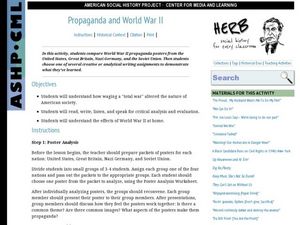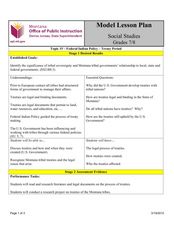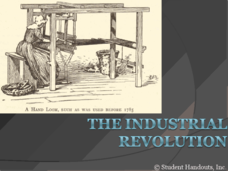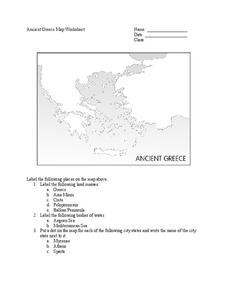Foreign Policy Research Institute
Teaching the 9/11 Anniversary
Here is a lesson on terrorism and 9/11. While outdated, it could be easily revised for today's teens. It includes targeted vocabulary, a background information activity, critical thinking questions, and step-by-step procedures for...
Curated OER
Propaganda and World War II
What was the true meaning behind WWII propaganda posters? Historians analyze images from the U.S., Great Britain, Nazi Germany, and the Soviet Union, sharing findings in small groups. A poster analysis worksheet and all posters are...
Curated OER
The Euro in Crisis
The November 14, 2011 edition of the New York Times included an article about debt and the European economy. Critical readers use the article to answer 13 who, what, when, where, and why questions.
Curated OER
Robe Design
You can learn a lot from a robe, especially if that robe is from the Qing Dynasty. Examine the beauty and symbolism that covers a functional and piece of clothing entitled Winter Dragon Robe. The class will consider and analyze all of...
Anti-Defamation League
What Is Culture?
Explore the complexity of culture with this rich and comprehensive lesson plan, which will prompt your learners to think critically and respectfully discuss our current definitions of culture, and how those definitions might evolve.
VH1
Lessons for Hight School Music Classes: Lesson 2
Art and music have been vehicles for statements of civil unrest for hundreds of years. Upper graders critically analyze several pop songs or music movements from the 1980s that exemplify politically charged motives. They analyze lyrics...
Curated OER
The Great Depression and New Deal
Elementary pupils are introduced to the Great Depression as a critical period of hardship in United States history. They engage in collaborative assignments researching the Dust Bowl, the New Deal, US presidents, and presidential libraries.
Curated OER
Global Environmental Issues: Air and Water Pollution
Thinking about designing a project for your social studies or environmental science classes? Use an overview of a project that prompts class groups to research an environmental issue.
Curated OER
Lesson: Ayman Ramadan: Koshary min Zamman
Examine the avant-garde movement and artists who explore the ideas of the Situationist. The class view imaged of Ayman Ramadan's installation pieces, learn about modern-day Egypt, and research other artist who use art to express social...
Curated OER
Federal Indian Policy
Students recognize the provisions of federal Indian policy. In this Federal Indian Policy lesson, students research legal documents (treaties). Students research the Montana tribes. Students answer critical thinking questions based on...
Curated OER
Antebellum Revivalism and Reform
A gold mine for American history teachers, this presentation cascades through the middle of the 19th century with the central themes of moral and social reform. Between the blossoming Mormon church, the tightening of the Temperance...
Curated OER
The Industrial Revolution
Contrasting between the "Haves" and the "Have-Nots" of 18th-19th century Europe, this presentation explores the social and technological implications of the Industrial Revolution. Inventions, social trends, and scientific breakthroughs...
Curated OER
Confucianism in a Changing Society
A great lesson promotes thoughtful discussion, global perspectives, and links between economics and culture. Learners view four clips showing how Confucian teachings have shaped Chinese culture and how filial piety plays a role in...
National Endowment for the Humanities
Lesson 4 James Madison: Internal Improvements Balancing Act—Federal/State and Executive/Legislative
Who has the power? The founding fathers asked the same question when the United States was formed. Learners explore issues that arose during Madison’s presidency that raised constitutional questions. Through discovery, discussion, and...
Curated OER
Advanced Art – Cultural Place-setting Still life
Upper graders view a series of films that depict rituals or celebrations as they occur in different cultural settings. They conduct a cultural investigation about one culture, brainstorm and research objects that have cultural or...
Foreign Policy Research Institute
Defining Democracy and Freedom
This is a simple but effective introduction to democracy. It requires the class to generate working definitions of key terms (provided) and to determine the degree of democracy in various geographic locations today. After they conduct...
Foreign Policy Research Institute
The Mind of a Terrorist: A Psychosocial Perspective
What a great way to make a psychology lesson on personality development socio-politically relevant! Class members investigate causes of radicalism--specifically, becoming a terrorist. This resource includes background information, key...
Curated OER
Executive Government: Executive Decision Making
Students make executive decisions. In this Social Studies lesson, students explore the concept of executive decisions through a game of chess. Students role play a year-level formal plan and implementation.
Curated OER
How were European nations capable of dominating the African contintnt?
Help your class determine why European was able to dominate the African continent. They read 5 excerpts, each related to a reason why Europe colonized Africa. Then they answer 4 critical-thinking questions.
Alabama Department of Archives and History
Alabama's 1901 Constitution: What Was at Stake?
Who should be able to vote? As part of a study of the 1901 Alabama Constitution, class members examine primary source document that reveal the reasons the authors gave to support their positions on this question and their assumptions in...
The New York Times
Revolt! Comparing Historical Revolutions
What elements are needed to have a revolution? How do historical revolutions from across the globe and generations compare with one another? This is an excellent activity that incorporates group work, source analysis, and an engaging...
Curated OER
Ancient Greece Map Worksheet
Since the beginning of time, geography has shaped the development of human civilization, and ancient Greece is no exception. This learning exercise supports young historians with exploring this relationship as they first identify key...
Middle Tennessee State University
The Invention of the Telephone
All of the people in your class would agree that life would be different without the invention of the telephone! Study Alexander Graham Bell's most famous and influential invention through the primary source document of his sketch of the...
K12 Reader
Abraham Lincoln Bio Poem
Everyone knows about Abraham Lincoln as a historical figure, but what was he like as a person? Young historians complete a biopoem about Lincoln, including his character traits, his relationships, his fears, and his needs.

























